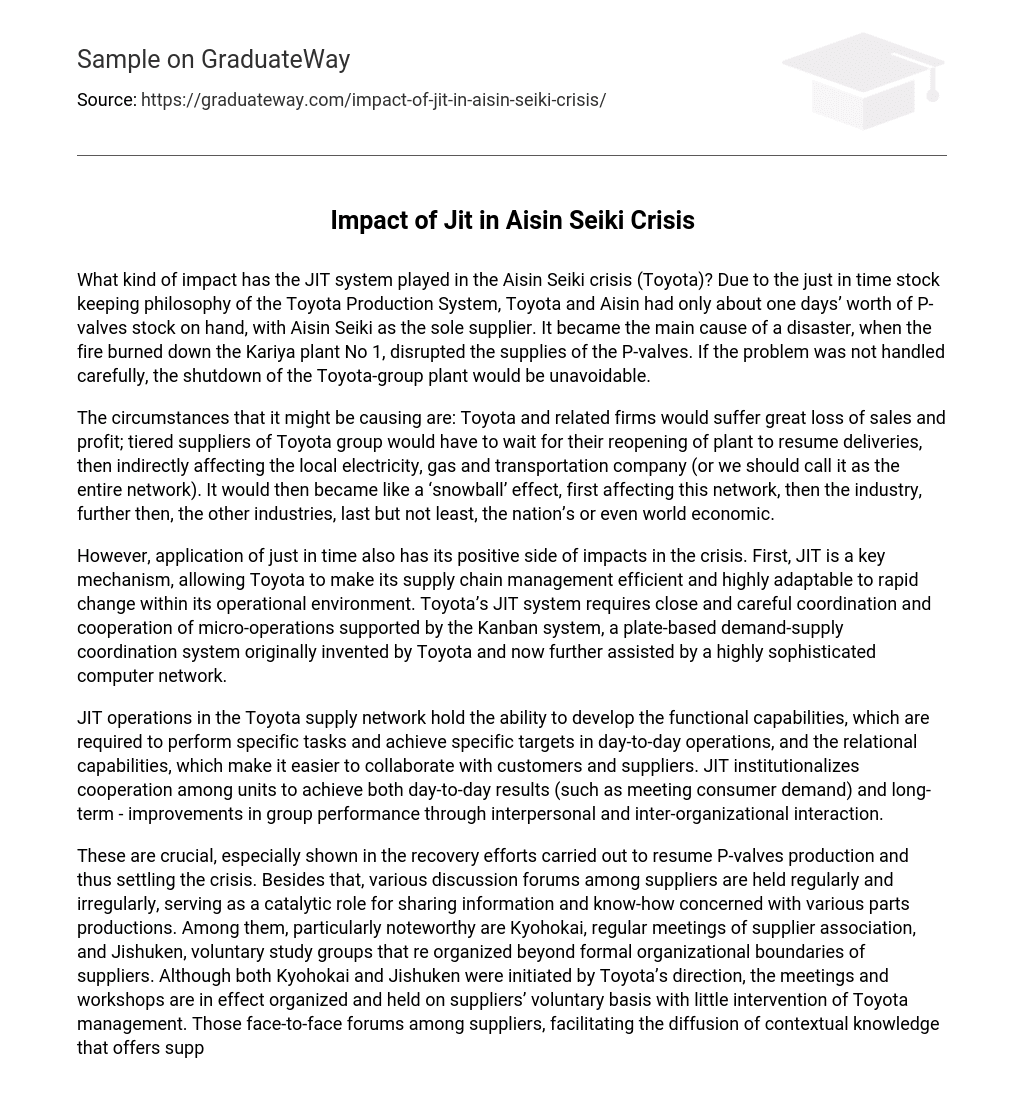What has been the impact of the JIT system in the Aisin Seiki crisis (Toyota)? The Toyota Production System’s just in time stock keeping philosophy resulted in Toyota and Aisin having only one days’ worth of P-valves stock, with Aisin Seiki being the only supplier. This became the primary cause of a disaster when a fire destroyed Kariya plant No 1 and disrupted the supply of P-valves. If not managed carefully, it would inevitably lead to the shutdown of the Toyota-group plant.
The circumstances that could arise are as follows: Toyota and related companies would experience a significant loss in sales and profits. The tiered suppliers of the Toyota group would have to wait for the reopening of the plant to resume deliveries, thereby indirectly impacting the local electricity, gas, and transportation companies, which we can consider as the entire network. This effect would then grow like a ‘snowball,’ initially affecting this network, then the industry, further extending to other industries, and finally impacting the nation’s or even the global economy.
On the positive side, the application of just in time (JIT) has beneficial impacts during a crisis. The JIT system is instrumental in making Toyota’s supply chain management efficient and adaptable to rapid changes in their operational environment. This requires close coordination and cooperation between micro-operations, which is facilitated by the Kanban system. Originally invented by Toyota, the Kanban system is now enhanced by a sophisticated computer network.
The Toyota supply network’s JIT operations possess the capacity to develop functional capabilities needed for specific tasks and targets in day-to-day operations, as well as relational capabilities that facilitate collaboration with customers and suppliers. JIT promotes cooperation among units to achieve daily results, such as meeting consumer demand, and long-term improvement in group performance through interpersonal and inter-organizational interaction.
These are crucial, especially in the recovery efforts undertaken to resume production of P-valves and thus address the crisis. Additionally, regular and irregular discussion forums among suppliers serve as a catalyst for sharing information and knowledge related to various parts productions. Notably, Kyohokai, a regular meeting of the supplier association, and Jishuken, voluntary study groups organized beyond formal organizational boundaries of suppliers, are significant. Although both Kyohokai and Jishuken were initiated by Toyota’s direction, the meetings and workshops are primarily organized and held on suppliers’ voluntary basis with minimal intervention from Toyota management. These face-to-face forums among suppliers facilitate the diffusion of contextual knowledge, offering them solutions to specific problems and helping them identify effective practices or contacts for further details.
These Just-In-Time (JIT) practices, as mentioned above, promote the fast spread and exchange of best practices and organizational learning by embedding the accumulation and solidification of highly implicit and context-specific knowledge about intricate production management processes. Furthermore, they contribute to cultivating a profound understanding of shared destiny and mutual acquaintance within the entire group and among the suppliers.
The Aisin fire crisis illustrates that the swift reaction from Aisin and Toyota is not coincidental. Instead, it highlights the ability to organize dynamic knowledge emergence, which has been cultivated through institutionalized practices within the Toyota group. These practices include continuously adjusting organizational settings in JIT operations and sharing knowledge in inter-supplier discussion forums.





